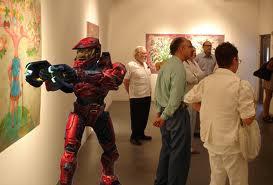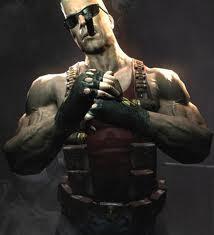Video Games are Art (and why that’s a dangerous thing)

Over the years, the debate has raged as to whether video games are art or not. Many critics *cough*Roger Ebert*cough* claim that they’re not, while most people involved in the industry and their fans claim that it is. I think over the years, the case has been made time and time again that video games are art.
For the sake of this article, though, I’d like to give a brief introduction to my theory of art. I keep coming back to a quote by Aaron Sorkin in West Wing: “An artist’s job is to captivate you for however long we’ve asked for your attention. If we stumble into the truth, we got lucky.” I’ve always liked that, and for me, it rings truer than a lot of some justifications of some self-aggrandizing, pretentious, artsy-fartsy “artistes” that I know.
Now, I was involved in theatre for a good number of years. This means that actors, playwrights, directors, coffee-shop philosophers, and “starving” artists are the kind of people that I’ve been around for a long time, and I love them. Hell, I’m one of them. I love getting a mocha and sitting around with my friends debating the pros and cons of artist’s rights and how they’re affected in the internet age. I played roles on stage that were really fun and creative, but always left my parents wondering where they went wrong. Even now, I’m trying to pursue a possible side career as an author.
But I’ve always been painfully aware that, no matter what, the arts are there to entertain first. Even if it’s just a quick little “hey, that’s a nice painting of some flowers,” the person that saw that painting was entertained.
Which brings me to video games. By my Sorkinese definition, video games are art. They hold our attention and captivate our imagination for anything from minutes to years. Everything from the little free game that comes preinstalled on your iPhone to Skyrim can be, and should be, considered art. The only difference is artistic value, which is a matter of opinion by critics. (Do I think Duke Nukem Forever is more artisticly valuable than Limbo? Sorry, won’t dignify that with an answer.)

(Sorry, Mr. Nukem. I’ll make it up to you in another article. Promise.)
Anyone who disagrees with me on that probably hasn’t made it this far into the article, so I think I’m among friends here (Welcome).
So, video games are art. But how in Solid Snake’s good name could that be a bad thing?
Because, while video games are art, and the artists that make them have every right to make what they want, they are still a commodity that is bought and sold. This is where the video game industry gets into an area that no other part of the entertainment industry goes.
See, books are usually written by one person. Then the editor reads it, makes notes, the authors makes any updates, then it goes to print. Quite simplified, but that’s the gist. Ultimately, though, it all comes from one person’s vision.
Movies are usually made by committee. The director, screenwriter, producers, actors, cinematographer, 1st unit director, 2nd unit director, lighting designer, costume designer, editor, sound designer, composer, (etc etc etc), all have a say in what ultimately gets put up on screen. Dozens of people making thousands of decisions.
Video games, however, are a little weird. There’s the game director, the writers, the animators, the texture artists, the programmers, the level designers, the composers, (etc etc etc), but they throw in an added element: the players.
No other form of art is as dependent upon its audience as video games are. Paintings and sculptures are images that are static; they do not move nor change. The book that I read twelve years ago will be the same when I read it tomorrow. The movie I watched yesterday will be the same forever (until the director’s edition comes out on Tuesday).
The point is that those are largely pedestrian forms of art. It requires nothing more from the audience than to sit back and enjoy.
Not video games. To truly enjoy a video game, you have to immerse yourself in it, and the developers have to anticipate that. They have to count on that. They have to plan to make such a good game that you want to spend as much time as possible playing and experiencing it. The developers pour hundreds of hours of their lives into each game. Each has a huge amount of personal pride that they invest into their work, and they should all be fiercely proud of their work.
But they rely on the audience to really bring their works to life. Until a gamer goes in and plays a level, it’s just lines of code on a disc. But a gamer can bring that code to life and each gamer does so in a totally different way. My default strategy for shooter games (“shotguns and assault rifles, CHARGE!!!”) is not the same as someone who enjoys a more strategic approach. Though the game remains the same, the experience is completely different. In that way, we influence the art, and have a say in the final product.
And therein lies the problem. Because video games are art, and everyone involved in developing the game takes pride in their work, we come to the inevitable occasion when the game developers’ artistic vision doesn’t match up with the fans’ artistic vision.
Both the players and developers have a right to feel protective of the game. The developers make the game, and the players make the game successful. The developers invest their time, their energy, and creativity into making the game. They take time away from their families to work late into the night to provide us, the gaming public, with a quality game to entertain us, to captivate us.

I’m told this is standard practice in the industry…
The players, in turn, invest their money, their time away from pursuing other forms of entertainment (such as socializing, bathing, or sleeping), but more importantly, they invest their emotions into these games to enjoy the experience, to fully appreciate the art that the developers have created.
By playing the games, we make them art. By allowing the games to affect how we feel, we make them personal. And when the artistic vision of the developers and the players oppose one another, we have a problem. Because the fans, while not doing anywhere near the amount of work into making the games themselves, helped to make them art. In film, when the director’s vision differs radically from the cinematographer’s, they have to figure a way to compromise. The problem with games is the difficulty in compromise. The game gets released, players buy it. Of course, there’s DLC that eventually comes out, but all in all, once it’s released, it’s done.
When the developers and the players disagree on a major point of a game, the normal thing that happens is that the game ends up as a commercial flop, and the gaming community moves on. But sometimes, the players get so emotionally invested in the game, they can’t move on. They care about these characters, and what happens to them.

“They like me, they REALLY like me!”
So, what happens in times like this? Do the developers apologize and change the game? In some cases, yes, they have. In some, no, they don’t. And nothing’s saying that they have to. They did the lion’s share of the work, they get to have the final say, right?
Maybe. It’s really a gray area, and there’s no right or wrong answer. It’s really something that has to be left for each studio to handle as they feel best.
Of course, they’re not stupid, and realize they won’t stay in business of they don’t put out good games that fans want, but the fans also have to understand that the studios have to push themselves to explore new territory.
I guess the point is that as long as video games are considered art, but are also bought and sold on the open market, there’s always going to be a fine line between artistic integrity and pleasing the masses. One that sometimes will be handled well, and sometimes, not so well. But as long as there’s a healthy respect between developers and fans, it should be one that isn’t too painful to cross every now and then.
Unless someone really screws something up, then they need to be strung up by their eyelids and pelted with shopping bags full of kiwis. That’s artistic too, right?



